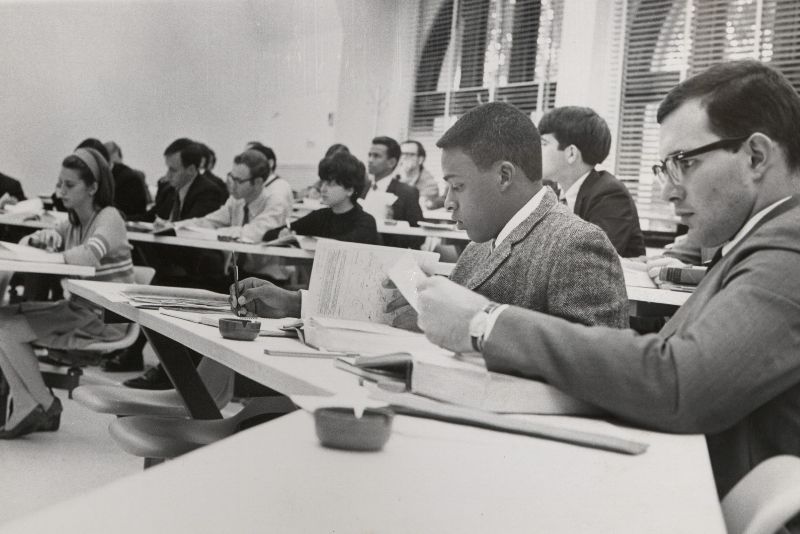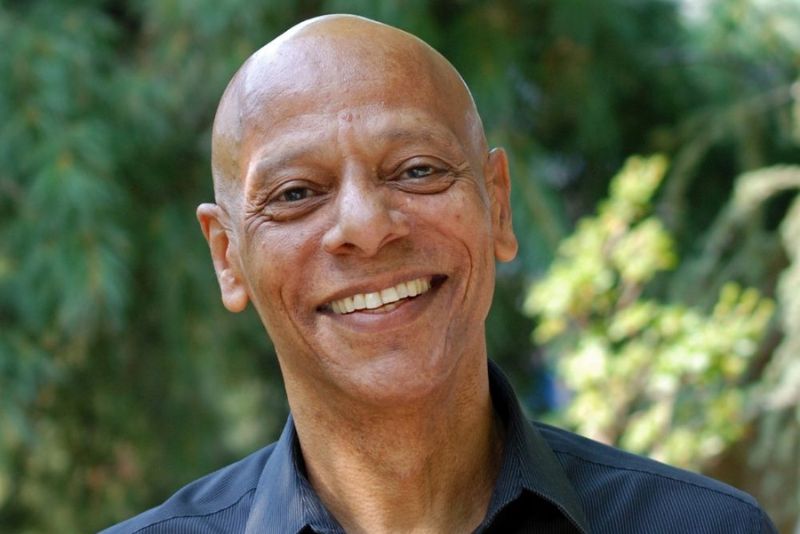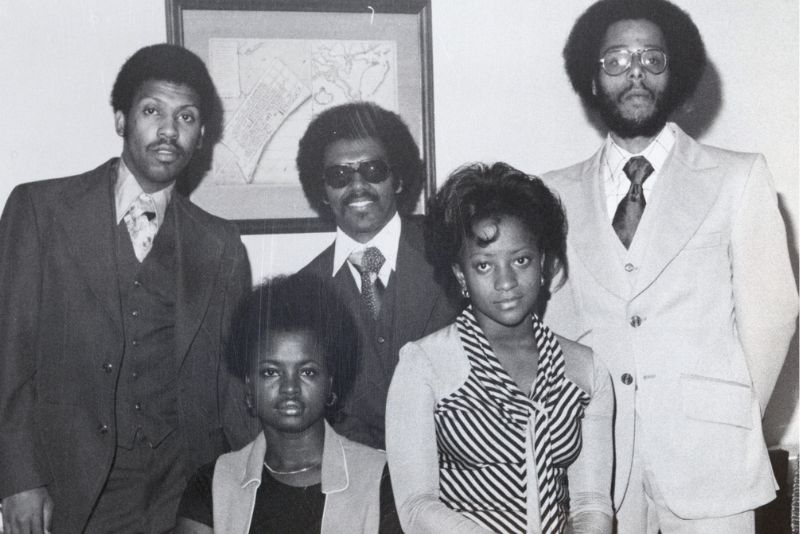Celebrating Black History Month at the Freeman School

Fostering and promoting diversity has long been a goal of the Freeman School. As we celebrate Black History Month, Freeman looks back at an early initiative to encourage more African American students to pursue MBAs. The following excerpt is taken from the 2014 book A Century of Business Education: The A. B. Freeman School of Business at Tulane University.
* * *
The first African American students were admitted to Tulane University in 1963, but when Larry Rivarde began the MBA program in 1974, Tulane’s Graduate School of Business Administration was still an overwhelmingly white institution.
“I’ll be honest,” Rivarde says. “It was challenging. Coming from a predominantly African American university to a predominantly white university, it can be challenging.”
Rivarde was one of the first students admitted to the Graduate School of Business as part of a pioneering program designed to boost African American enrollments. The Tulane/Xavier Joint MBA program enabled undergraduate students from Xavier University in New Orleans, a historically black institution, to earn an MBA from Tulane with just one additional year of study. Students admitted to the program received a full scholarship to the MBA program as well as room and board and a monthly stipend. While few people today are aware of the program, in the early 1970s it played a big role in opening up the business school to minority students.

Since the program’s inception, more than 100 students from Xavier have earned advanced business degrees from Tulane, and many of those graduates have gone on to senior leadership positions with local and national firms.
“Tulane was extremely generous with scholarship money over the years,” says Xavier University Accounting Professor Cliff Wright, who’s been involved with the program since its start. “I think it’s a story that needs to be told.”
The Tulane/Xavier program was actually a spinoff from an earlier initiative to increase the number of African Americans in the engineering profession. In 1969, Olin Corp., a chemicals manufacturer, created a scholarship program at Georgia Tech to increase minority enrollments in engineering. That program, a partnership with Atlanta University Center, a consortium of historically black colleges, proved to be so successful that Olin and its funding partner, the Alfred P. Sloan Foundation, decided to broaden their focus to include advanced business study as well.
In 1973, Olin Corp. and the Sloan Foundation awarded Tulane a $326,250 grant to establish an MBA scholarship program for students at Xavier. Under the terms of the program, students from Xavier would enroll in Tulane’s MBA program as seniors, with credits applying jointly toward their undergraduate degrees and the MBA.
“There is a growing demand for black and other minority students holding MBA degrees, yet relatively few minority students are aware of opportunities open to those with such degrees, and fewer still are entering MBA programs,” said Theodore J. Olsen, vice president for administration at Olin Corp., in announcing the program. “We are gratified to be a part of this innovative Xavier-Tulane program because we think it is an excellent way to increase the number of highly qualified black graduates available to a wide range of rewarding careers in business.”
In 1974, Rivarde and classmates Joanell Darnell, Peggy Gibson, Leon Jones, Adam Lemieux, Joyce Morgan and Glenn Philips became the first students admitted to the program. While he had some trepidations about attending a predominantly white university, Rivarde says the Graduate School of Business welcomed the Xavier students with open arms.

“We had nothing but support from the staff and the professors,” says Rivarde, who today serves as executive vice president of the Audubon Nature Institute. “They were really willing to work with us.”
Despite their differences in age and background — the Xavier students were several years younger than most of their classmates — Rivarde says he got along well with his new classmates, who treated him like any other student in the program.
“I didn’t feel like I was isolated or an outcast,” says Rivarde. “I felt like I was part of the student body. I didn’t want to be singled out and be any different. I just wanted to be a regular student.”
The initial grant to fund the program lasted for about 10 years. When it ran out, Tulane continued to fund the program on its own. In the early 1990s, admission requirements for the MBA program were changed to require full-time work experience, a change that led to the discontinuation of the program, but the Freeman School continues to pursue diversity today with dedicated scholarship programs for Xavier students in both the Master of Accounting and Master of Finance programs.
While minority enrollments continue to trail white enrollments, the Freeman School today is a much more diverse institution, with minority students accounting for 20 percent of total enrollments.
The Freeman School’s commitment to diversity enables students from a variety of backgrounds to enjoy the same educational opportunity Larry Rivarde got 40 years ago, and it’s an opportunity Rivarde wouldn’t trade for anything.
“It was the best decision I ever made in my life,” says Rivarde. “All of my instructors were just stupendous. I learned so much from them. You can’t measure it.”
Recommended Reading
- MBA vs. Master’s in Accounting: What Are the Differences?
- How to Get Into Graduate School
- Tips for Balancing Work, Life, and Graduate School
- What Are the Requirements to Get Into Business School Graduate Program?
- What Are Dual Master’s Degree Programs?
- Can I Get a Scholarship or Fellowship for Graduate School?
- Business Education Options: What Graduate Degree Should I Get?
- Financial Aid for Graduate School: Everything You Need to Know
Other Related Articles
- Panel highlights intersection of medicine and business
- Uncommon Denominators: Alums defy the odds in business academia
- Changing the face of medicine
- EMBA program opened door for alum; now she’s paying it forward
- Students awarded NOLA Clean Energy fellowships
- Freeman helps Posse scholars take care of business
- Delivering the future
- Visionary Leadership: Alum hopes to transform optical services for marginalized communities
